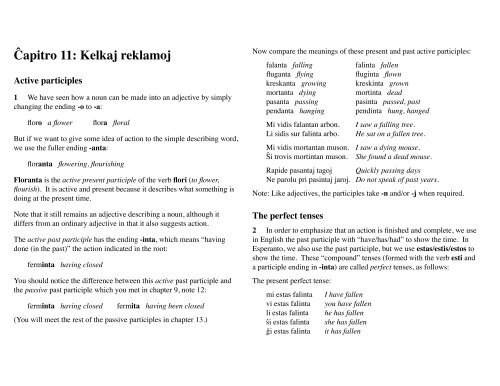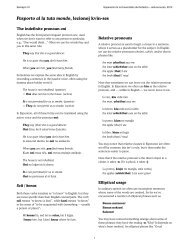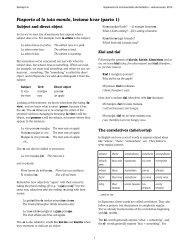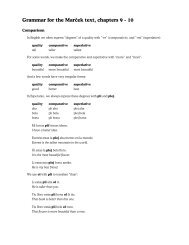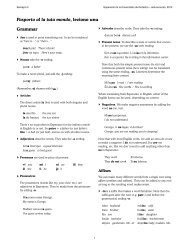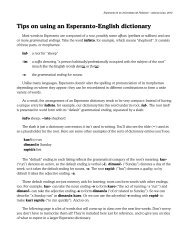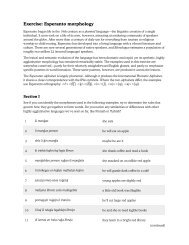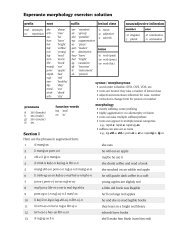The alphabet and pronunciation - Lodestone
The alphabet and pronunciation - Lodestone
The alphabet and pronunciation - Lodestone
- No tags were found...
You also want an ePaper? Increase the reach of your titles
YUMPU automatically turns print PDFs into web optimized ePapers that Google loves.
!apitro 11: Kelkaj reklamojActive participles1" We have seen how a noun can be made into an adjective by simplychanging the ending -o to -a:! floro a flower! flora floralBut if we want to give some idea of action to the simple describing word,we use the fuller ending -anta:! floranta flowering, flourishingFloranta is the active present participle of the verb flori (to flower,flourish). It is active <strong>and</strong> present because it describes what something isdoing at the present time.Note that it still remains an adjective describing a noun, although itdiffers from an ordinary adjective in that it also suggests action.<strong>The</strong> active past participle has the ending -inta, which means “havingdone (in the past)” the action indicated in the root:! ferminta having closedYou should notice the difference between this active past participle <strong>and</strong>the passive past participle which you met in chapter 9, note 12:" ferminta having closed! fermita having been closed(You will meet the rest of the passive participles in chapter 13.)Now compare the meanings of these present <strong>and</strong> past active participles:! falanta falling! falinta fallen! fluganta flying! fluginta flown! kreskanta growing! kreskinta grown! mortanta dying! mortinta dead! pasanta passing! pasinta passed, past! pendanta hanging! pendinta hung, hanged! Mi vidis falantan arbon.! I saw a falling tree.! Li sidis sur falinta arbo.! He sat on a fallen tree.! Mi vidis mortantan muson.! I saw a dying mouse.! "i trovis mortintan muson.! She found a dead mouse.! Rapide pasantaj tagoj! Quickly passing days! Ne parolu pri pasintaj jaroj.! Do not speak of past years.Note: Like adjectives, the participles take -n <strong>and</strong>/or -j when required.<strong>The</strong> perfect tenses2" In order to emphasize that an action is finished <strong>and</strong> complete, we usein English the past participle with “have/has/had” to show the time. InEsperanto, we also use the past participle, but we use estas/estis/estos toshow the time. <strong>The</strong>se “compound” tenses (formed with the verb esti <strong>and</strong>a participle ending in -inta) are called perfect tenses, as follows:<strong>The</strong> present perfect tense:! mi estas falinta! I have fallen! vi estas falinta! you have fallen! li estas falinta! he has fallen! #i estas falinta! she has fallen! $i estas falinta! it has fallen


